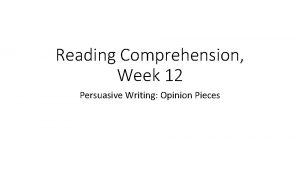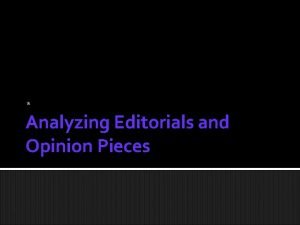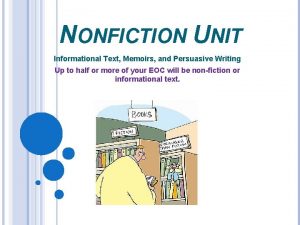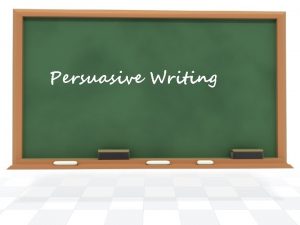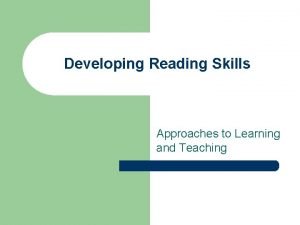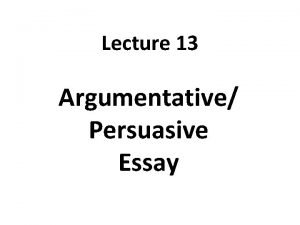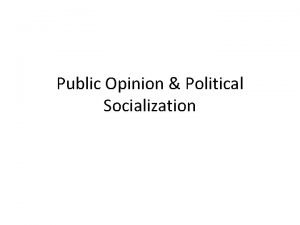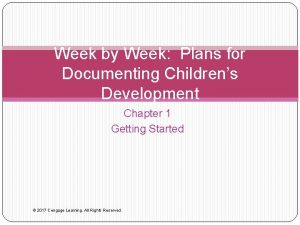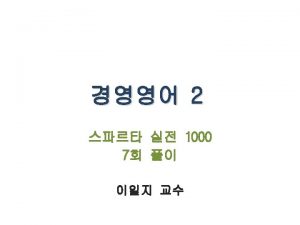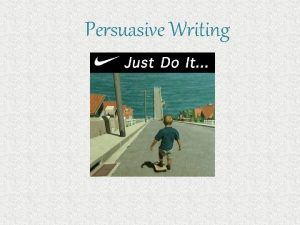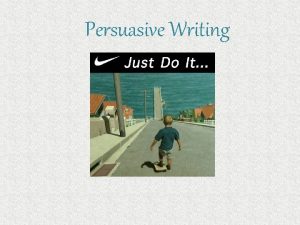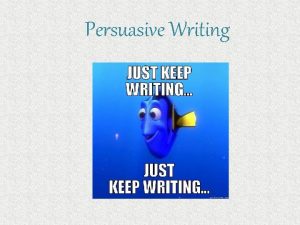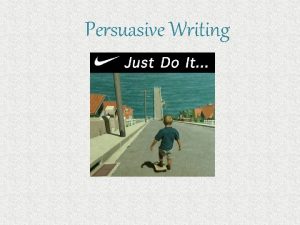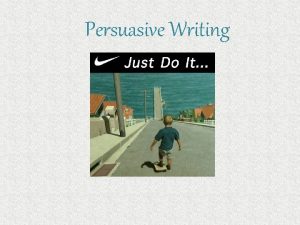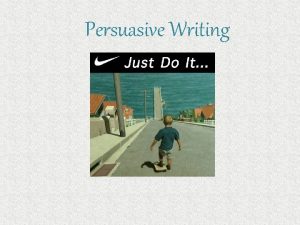Reading Comprehension Week 12 Persuasive Writing Opinion Pieces









- Slides: 9

Reading Comprehension, Week 12 Persuasive Writing: Opinion Pieces

Overview This lesson extends some of the discussion about French as a world language in the previous week to a Moroccan context. There are four editorials for the readings, each of which takes a different view of the role of French in Morocco’s present and future. Students will read one of these articles and do an analysis of the argument presented in it using Stephen Toulimin’s model of argumentation (see next slide). The instructor will have to teach this model to the students first. Then the students will read the editorial, construct a one-sentence summary of its argument, and then apply information in the article to a Toulminian analysis of that argument.

Toulmin’s Model Toulmin’s model shows how data (facts) are used to make claims but in the process are supported by warrants (assumptions about the facts) and their backing (evidence supporting the warrants). In addition, arguments have qualifiers (exceptions to the argument) that are also rebutted (argued against). Sound, believeable arguments are thought to have all of these elements. Weak arguments typically have “facts” and claims but no development in terms of warrants, qualifiers, or rebuttals.

Toulmin’s Model of Argumentation (Qualifier) Alternatives Datum Claim (your argument) (Facts) Warrant (Theory, assumptions) Backing Support for the warrant Rebuttal How you counter the alternatives

An example of an analysis for the argument: French remains an important world language. Qualifier (Alternatives) Some nations are dropping French; it is not growing as fast as Spanish or English Datum (Facts): Claim (your argument) French is spoken in France, Belgium, Luxembourg, most of West and Central Africa, Canada, and South America, and is widely taught. French remains an important world language. Warrant (Theory, assumptions) A “world language” is one that is spoken widely and by many millions of people. Backing (Support for the warrant) Other world languages include English, Spanish, and Mandarin Rebuttal (How you counter the alternatives) But French remains a strong language in West and Central Africa, where populations are growing, and Quebec may become an independent francophone nation in North America soon. Moreover, there is room in the world and need for more languages than English and local languages.

First Hour • Remind students of last week’s discussion of French as a world language. Raise the issue: What is the future of French in Morocco? Should it stay or should it go? Can it stay but alongside English? Get student opinions and record these on the board. • Tell students that today we have four editorials with different views about French in Morocco. Explain what an editorial is. The students’ task is to read one of these articles and analysis the strength of its argument. • Explain Toulmin’s model of argumentation using the diagram in previous slides. Have a handout for the students with the example of the argument that “French remains an important world language” on it. • The students are to read the editorial given to them, condense its argument to one simple sentence, and then analyze the argument presented in the article using Toulmin’s model. • Divide the class into four sections and give each section copies of one of the editorials. Have the students read in small groups of 4 -5. Give them large sheets of paper and markers to draw Toulmin’s model and list their analysis.

Hour Three • Each section will meet and compare analyses among small groups. The two best of these as selected by the students will present their analyses to the whole class. • Conduct a whole class discussion: What did you think of the editorial you read? Was its argument solid? What were the strengths and weaknesses? • Consider your own opinion on this issue. If you were going to write an editorial, what would be your data, what would be your claims, what would be your warrant and backing, and what would be your qualifiers and rebuttal? • Assign the students to write a one-page argument expressing their opinion on: The role of French in Morocco in the Present and Future.


Hour Two • The students will need much of this hour to read and conduct their analysis. The instructor should move among the students, answering questions and troubleshooting. • The students should have read the article by the half hour and begin their discussion. They may record ideas on small sheets of paper before transferring these to the larger sheets.
 Persuasive comprehension
Persuasive comprehension Purpose of editorials
Purpose of editorials Denotative dog
Denotative dog A writer who uses persuasion attempts to
A writer who uses persuasion attempts to Pre reading while reading and post reading activities
Pre reading while reading and post reading activities My sidewalks level b unit 2 week 5 fluency sentences
My sidewalks level b unit 2 week 5 fluency sentences Persuasive essay vs argumentative
Persuasive essay vs argumentative Argumentative essay vs expository essay
Argumentative essay vs expository essay Private opinion becomes public opinion when
Private opinion becomes public opinion when Week by week plans for documenting children's development
Week by week plans for documenting children's development
